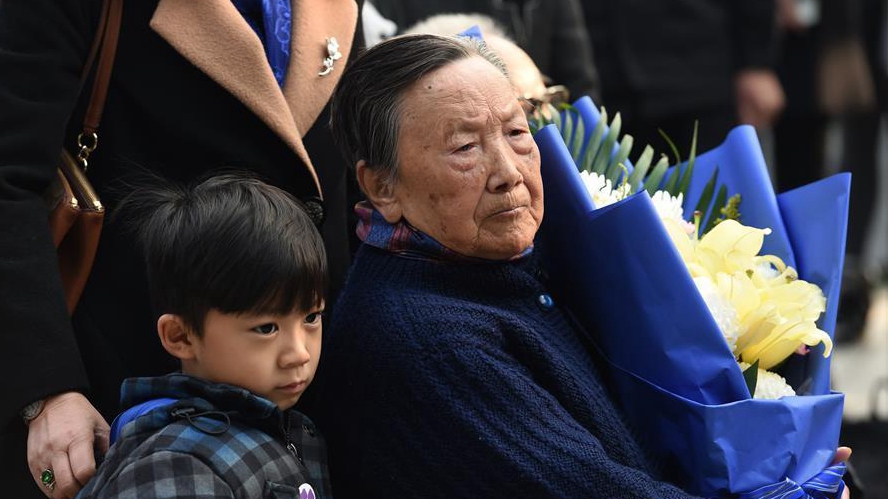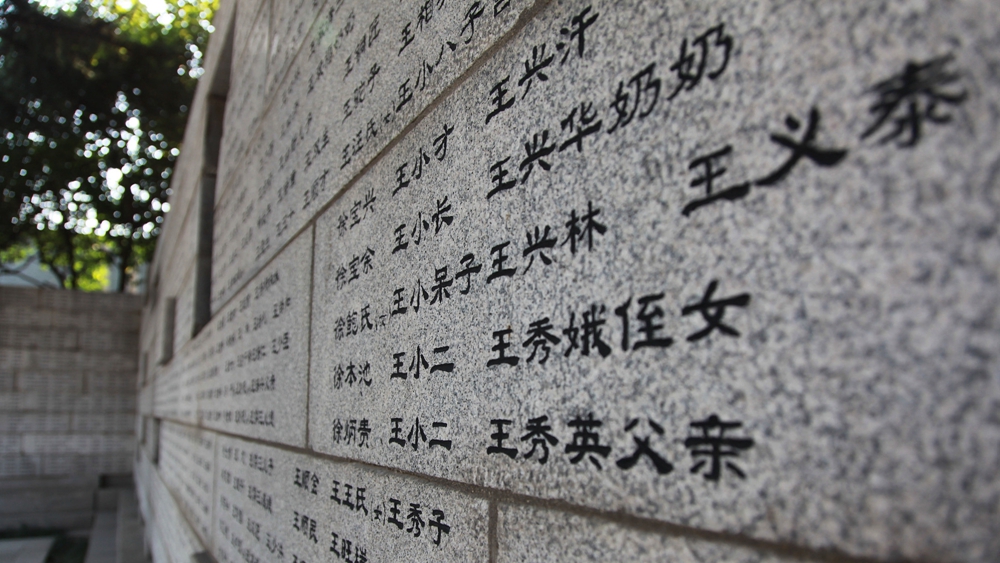
Xia Shuqin (R), a survivor of the Nanjing Massacre, and her family members mourn the victims at the Memorial Hall of the Victims in Nanjing Massacre by Japanese Invaders in Nanjing, east China's Jiangsu Province, December 3, 2016. /Xinhua
Xia Shuqin (R), a survivor of the Nanjing Massacre, and her family members mourn the victims at the Memorial Hall of the Victims in Nanjing Massacre by Japanese Invaders in Nanjing, east China's Jiangsu Province, December 3, 2016. /Xinhua
"I'm 91 years old. I don't know how many years are left for me to go to the memorial hall to mourn my relatives," said Xia Shuqing, who went to the Memorial Hall of the Victims in Nanjing Massacre by Japanese invaders in Nanjing, east China's Jiangsu Province, on November 25, the Yangtse Evening Post reported.
She is one of the survivors of the Nanjing Massacre, where more than 300,000 civilians and unarmed soldiers were killed during a six-week mass killing that began on December 13, 1937.
With four massacre survivors dying this year, the number of survivors officially registered at the memorial hall has now fallen to 73. In 2017, there were still 100 survivors living in the country.

What they want us to inherit: Remembering history and cherishing peace
"I hope in the rest of my life that the Japanese government can apologize to me, saying that it was sorry for killing my relatives," Xia told Yangtse Evening Post when she stood in front of the "wailing wall" at the memorial hall.
The wall, initially built in 1995, is engraved with the names of 10,665 victims.
Xia lost seven members of her family in the massacre. "I miss them, they suffered a miserable death," said Xia, adding that "I hope the Japanese government can face the history and acknowledge the massacre."
Ai Yiying, 92, met Xia at the memorial hall. The two held each other's hands and asked about how the life is going.
"I could not help crying when seeing my father's name on the wall," Ai told Yangtse Evening Post. "I hope the later generations can understand this phase of history, remember it and cherish the peaceful life nowadays."
Lu Hongcai, 88, lost his mother, younger sister and great grandparents in the massacre. "There is a stark difference between the life in old days and in modern days. Nowadays, people enjoy a materially and spiritually rich life. I hope the youths can remember the piece of tragic history," Lu was quoted by Chinanews.com as saying.
The 88-year-old often tells the young listeners what he experienced, though he has to suffer the pain of missing his family members.

The names of victims in Nanjing Massacre on the wailing wall at the Memorial Hall of the Victims in Nanjing Massacre by Japanese invaders in Nanjing, east China's Jiangsu Province, November 16, 2014. /CFP
The names of victims in Nanjing Massacre on the wailing wall at the Memorial Hall of the Victims in Nanjing Massacre by Japanese invaders in Nanjing, east China's Jiangsu Province, November 16, 2014. /CFP
Ways to pass the history from generation to generation
As the survivors of the mass killings in the winter of 1937 are mostly in their 80s or older, it's important to take measures to keep their memory alive and let the history pass from generation to generation.
The memorial hall receives more than eight million visitors every year, many of whom are from foreign countries. It started to hold the ceremony for the National Memorial Day for Nanjing Massacre Victims in 2014.
In past 35 years, the hall has collected about 180,000 items, including 4,000 pictures and 262 videos. It is now digitizing its collections to put them on the internet to share with more people.
To keep alive the testimony of survivors' on the massacre, Nanjing launched three large-scale censuses on survivors respectively in 1984, 1991 and 1997.
"The most convincing evidence is undoubtedly what experiences the survivors told," said Fei Zhongxing, a member of a research center that has been collecting survivors' oral testimonies since April 2012.
On April 5, 2019, the hall launched a movement inviting the survivors' descendants to inherit their ancestors' memories. Some of the descendants were reported to write relevant books, give speeches on the miserable memory, and even give testimony in Japan.
In October, 2020, the hall has recruited 73 new foreign volunteers to help spread the history. The volunteers from countries including the U.S. and ROK were said to serve as docents and translators and contribute to international exchanges.
"We'll never forget the tragedy and we'll never forgive the massacre committed by the invaders," said Zhang Jianjun, curator of the memorial hall, was quoted by China Daily as saying.
"Its history must be passed on to the young generation to better understand it and love peace from the bottom of their hearts."
The 2020 ceremony for the National Memorial Day for Nanjing Massacre Victims will be held at the memorial hall on Sunday morning.

